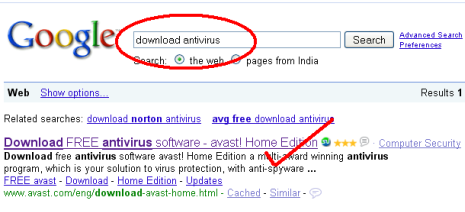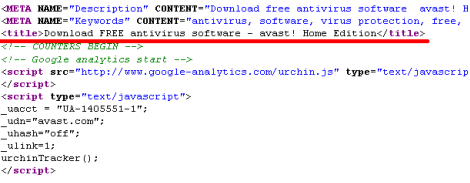Search Engine Optimization For Dummies
The aim of this post is to show you how to make your content Search Engine Optimized to get most out of your effort. It is very important part for your online success. This post contains the basics of search engine optimization methods. It is not difficult to implement the basic methods.
Before going to details I would like to say that Keyword Research is the core of Search Engine Optimization. If you don’t have idea about Keyword Research then you can view my post:
OK, now you have done with your keyword research for your selected niche. Next step is to optimized your contents so that search engine can find your contents.
There are two types of optimization methods: Onpage Optimization and Offpage Optimization. Let me start with OnPage optimization.
Onpage Search Engine optimization:
Onpage optimization basically consists of all of the ranking factors that are located on your webpage. I am going in details steps of these ranking factor.
1.Title: This is the title of your webpage. In html it looks as <Title> </Title>. It is very important to put your main keyword inside title. If you put blank inside title tag you won’t be able to rank in search engine.
To get idea write “download antivirus” in Google and see what’s come up. I got as below:

Download FREE antivirus software - avast! Home Edition - this is the title of the page www.avast.com/eng/download-avast-home.html. To make sure go to the website and see the source view of that page. just right click and click view source.

Google shows the title of any web page in their search result. Try to complete your title withing 60 character.
2.Meta Description: It appears just below the title in the search engine result. Make a proper description for your webpage including all your main keyword. Don’t put more than 5 keywords and try to complete meta description within 160 character. You can see meta description in source view as:

Put your keywords in Meta Keywords also but search engine doesn’t give value for that because of peoples spamming nature.
3.Header Tag: These are the tags that appear as <h1></h1> <h2></h2> <h3></h3>. There are total 6 header tag up to h6. Use it for your webpage properly. Put your page main heading including main keyword in the <h1></h1> tag and sub heading including sub keyword <h2> </h2> tag and continue like this. Whenever search engine crawl your page it crawl the header tags before the text.
4.Bold, Italic Tag: Use <strong></strong> tag to make your text bold and <i></i> for italic. Mind that I did not say to use <b></b> to make bold because search engine give more importance to <strong></strong> tag. Try to make your main keyword bold al least in first paragraph.
5.Image Alt: Alt is an attribute for the img tag. It appears when the browser can’t display image. Here is an example how you have to use :
<img src=”image path” alt=”click To Download Antivirus”> </img>
Always put meaningful content using keyword. Don’t overdo it as search engine may see it as spam.
6.Link: Link are used to link another page or website. It appears in html as
<a href=”download.html”> Download Antivirus</a> Always use good Anchor text while creating link and use your keyword.
<a href=”download.html”> Click Here</a> is NOT a good example of
onpage optimization. It is not an optimized method to use image or flash files while creating hyperlink because spiders for most search engines do not typically crawl links within Flash files or images.
Well, these are the basic Onpage Search Engine Optimization Methods.
Offpage Search Engine optimization:
Offpage optimization basically consists of all of the ranking factors that are NOT located on your webpage, that the search engines look at when ranking a website.
These include:
- Which websites link to you
- The number of websites linking to you
- The Google rank of the website linking to you
- The page title of the website linking to you
- The anchor text used in the link linking to you
- The number and type of links linking to the website that’s linking to you.
- The number of outbound links on the website that is linking to you
- The total number of links on the website that is linking to you
- The IP Address of the websites linking to you.
For Offpage optimization you need to promote your website. It is not simple as Onpage Optimization. For this you need to opt different methods such as Article Marketing, Forum Posting, Blog Posting, Web2.0 etc. As it is difficult to cover everything in one post I am going to write in different post.
Did you liked my post? If yes please consider it for bookmarking or give me a feedback.
Tags:search engine optimization basics,search engine optimization for beginners,search engine optimization for dummies,search engine optimization tutorial,SEO Tips
Related posts
Internet highlights
- Best Non Gamstop Casino
- Miglior Casino Non Aams
- Migliori Siti Casino Online
- Non Gamstop Casino
- UK Online Casinos Not On Gamstop
- Non Gamstop Casino
- Siti Casino Non Aams
- Bookmaker Hors Arjel Acceptant Les Français
- Casino Sites Not On Gamstop
- Meilleur Casino En Ligne
- Non Gamstop Casino UK
- UK Casino Not On Gamstop
- Non Gamstop Casino UK
- Non Gamstop Casino UK
- Casinos Not On Gamstop
- Non Gamstop Casinos
- Migliori Siti Casino Non Aams
- Best UK Casino Sites
- Non Gamstop Casino UK
- UK Casinos Not On Gamstop
- Non Gamstop Casinos
- Best Betting Sites In UK 2025
- Casinos Not On Gamstop
- Casino Italiani Non Aams
- Casino Non Aams
- Crypto Casino
- Casino Français Crypto
- Sites De Paris Sportifs Belgique
- Sites De Paris Sportifs Belgique
- Casino Online
- Casino Non Aams
- Casino En Ligne Avec Retrait Immédiat
- Site De Paris Sportif Tennis
- ライブカジノ ルーレット
- オンカジ 出金早い
- Meilleur Casino En Ligne
- Casino En Ligne
- Casino Online
- Meilleur Site De Casino En Ligne
- Meilleur Casino En Ligne 2026
- Casino En Ligne Français



















Great tip on limiting the meta tag description to under 160 words. In the past, I’ve never paid attention to how long my description was.
Mike Humann’s last blog post..3 Things to do During the Summer to Improve you College Financing
Thank you so much for the illustrations to back up this important post about SEO, or search engine optimization. Sometimes we forget all about doing the basic research before we start writing for SEO. It is important to use the right keywords and have a nice balance that does not overtake your content’s impact. Those spiders can be particular about what they like.
Rocque’s last blog post..Internet Coaches Series~5
Good point Rocque
Before you put any time into optimizing your site for keywords, you first need to see if there is a market for those keywords. You can have the best site out there for something, but if noone is searching fro that something, it is wasted.
Instead of <i></i> I would use <em></em>. The i is now deprecated. Otherwise a good post on proper SEO. Look forward to the post on offpage optimization
Hi RobneyB,
Thanks for your feedback. I forgot to mentioned about <em></em> while publishing post. After reading your comment I saw one of my post in html mode. I saw it was <em></em> for one of my italic word. Thanks for pointing out my mistake.
Thanks for your post. Keyword research is very important for onpage SEO and I appreciate your detail in the various ellements keywords should be used. html and I don’t get along to well so this is a good resource for me
Luca’s last blog post..How To Use PLR Content in Your Newsletters and Ezines
Thank you for your post! I will bookmark this page for future reference to make sure I don’t forget some of these valuable tips!
Fiona’s last blog post..How To Take The Best Blog Software To Another Level
I have implemented your suggestions in a blog post I did today…thanks for the tips!
Fiona’s last blog post..Internet Marketing for Newbies - Time Saving Tip for Firefox
Welcome my friend!
Very good and detailed post! Off page factors are extremely important and I’m glad you listed them - as long as people understand what is needed, it is simple to implement
Alex Sysoef’s last blog post..Make Money Blogging Blueprint
Thank you Alex for your feedback..
Very good post, I didn’t know of importance of “strong” vs. “b” tags as well as some of the other things you’ve mentioned. Will definitely come back to reference in the future.
Mike Riley’s last blog post..Making Home Affordable: Program’s Loan-To-Value Limit May Soon Change
As I returned to reread this post I did pick up more information that I seemed to have missed the first time. That is why I like blogs and the comment feature, so we can go back and add to what others are saying, and learn more.
There is so much information here that it takes people a lot of searching to discover on their own.
Thanks again for sharing it.
Rocque’s last blog post..Internet Coaches Series~5
Search Engine Optimization For Dummies…
Tips on making your blog search engine optimized.
Great read!
I have a SEO blog and I suggest this to all my readers at minimum for proper SEO.
Congrats on making it to the front of blogengage without being auto promoted!
Normally I will publish all content from members that upload their avatar and update their profile but apparently people voted you there so it’s all good!
Hope to see you active and voting!
bb’s last blog post..Chicks 101: How to land a supermodel!
Good & Brief write up. Keep it up buddy.
Cheers:)
This is good in terms of SEO. Naught looks to rag upon them than this.Ironically, this is just was talked about some years ago at the big blackhat about SEO in ‘94.
Thank you for the great tip, I really appreciate it. But I have one question. What if I use too much text bold? Is that allowed?
According to the SEOMOZ search engine ranking factors, now it has very less or no impact on ranking. It is better to make it natural.
This site is very very useful for who waitn to make money form internet.
Hi, I would like to ask. Is it a requirement to have your own domain name to be listed in Google or in any other search engine? Hope you could enlighten me on this. Thanks
Hi Odri,
Thank you for your question. I believe you are referring “to be listed” to ranking in search engine. If it is then we don’t need own domain in order to rank in search engine. You can rank an article, web2.0 properties such as Weebly, Blogger blog etc as well. Just observe first page of Google and you will see lots of example.
Let me know if you have any question and I will be glad to answer.
Thanks,
Chandan
Great blog, This has helped me very much with my seo learning! I continue to learn a lot from your blogs.
Glad to get the feedback. Thank you.
Regards,
Chandan
I noticed something interesting about your site. Even though it shows no Page Rank, it has a very high AC rank in Majestic SEO. How new is your site? I’ve heard that Google probably won’t update page rank again, as it’s obsolete. Have you heard that also? Just wondering how important Page Rank will be moving forward.